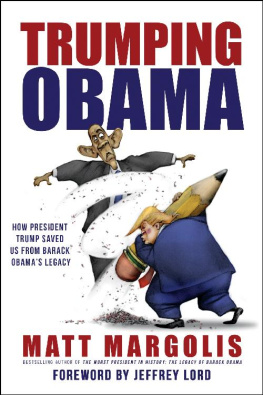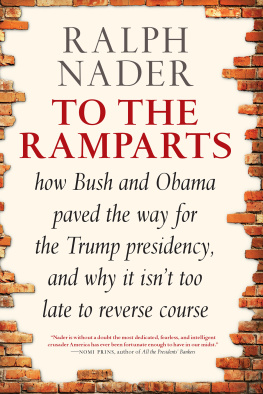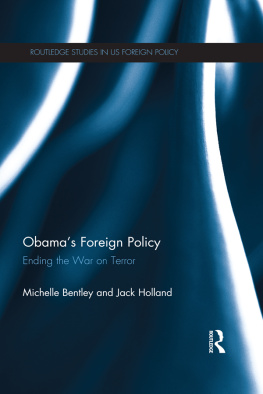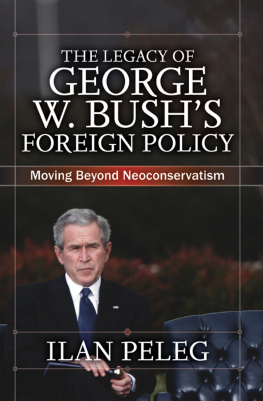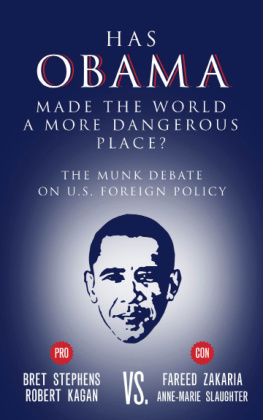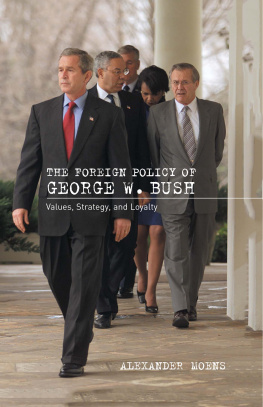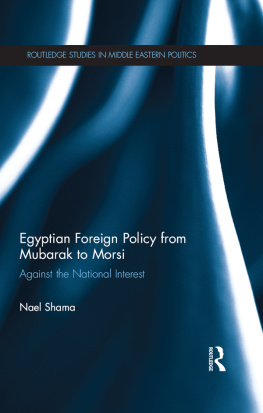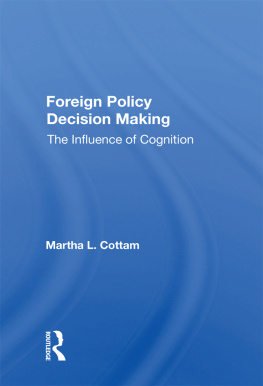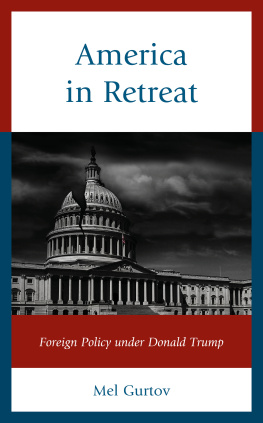DuraniI - America in Afghanistan: foreign policy and decision making from Bush to Obama to Trump
Here you can read online DuraniI - America in Afghanistan: foreign policy and decision making from Bush to Obama to Trump full text of the book (entire story) in english for free. Download pdf and epub, get meaning, cover and reviews about this ebook. City: Place of publication not identified, year: 2018, publisher: I.B. Tauris, genre: Politics. Description of the work, (preface) as well as reviews are available. Best literature library LitArk.com created for fans of good reading and offers a wide selection of genres:
Romance novel
Science fiction
Adventure
Detective
Science
History
Home and family
Prose
Art
Politics
Computer
Non-fiction
Religion
Business
Children
Humor
Choose a favorite category and find really read worthwhile books. Enjoy immersion in the world of imagination, feel the emotions of the characters or learn something new for yourself, make an fascinating discovery.
- Book:America in Afghanistan: foreign policy and decision making from Bush to Obama to Trump
- Author:
- Publisher:I.B. Tauris
- Genre:
- Year:2018
- City:Place of publication not identified
- Rating:3 / 5
- Favourites:Add to favourites
- Your mark:
- 60
- 1
- 2
- 3
- 4
- 5
America in Afghanistan: foreign policy and decision making from Bush to Obama to Trump: summary, description and annotation
We offer to read an annotation, description, summary or preface (depends on what the author of the book "America in Afghanistan: foreign policy and decision making from Bush to Obama to Trump" wrote himself). If you haven't found the necessary information about the book — write in the comments, we will try to find it.
DuraniI: author's other books
Who wrote America in Afghanistan: foreign policy and decision making from Bush to Obama to Trump? Find out the surname, the name of the author of the book and a list of all author's works by series.
America in Afghanistan: foreign policy and decision making from Bush to Obama to Trump — read online for free the complete book (whole text) full work
Below is the text of the book, divided by pages. System saving the place of the last page read, allows you to conveniently read the book "America in Afghanistan: foreign policy and decision making from Bush to Obama to Trump" online for free, without having to search again every time where you left off. Put a bookmark, and you can go to the page where you finished reading at any time.
Font size:
Interval:
Bookmark:

Sharifullah Dorani completed his PhD on the War in Afghanistan at Durham University. He has lived and worked in Afghanistan and lectures on the history of US policy in the region.

I.B.TAURIS
Bloomsbury Publishing Plc
50 Bedford Square, London, WC1B 3DP, UK
1385 Broadway, New York, NY 10018, USA
BLOOMSBURY, I.B.TAURIS and the I.B.Tauris logo are trademarks of Bloomsbury Publishing Plc
First published in Great Britain 2019
Copyright Sharifullah Dorani, 2019
Sharifullah Dorani has asserted his right under the Copyright, Designs and Patents Act, 1988, to be identified as the author of this work.
Cover design: Ian Ross www.ianrossdesigner.comCover image: Afghan family rides on a motorcycle as a US soldier stands guard at Qader village, Logar Province. 14 August 2009. MANAN VATSYAYANA/AFP/Getty Images.
All rights reserved. No part of this publication may be reproduced or transmitted in any form or by any means, electronic or mechanical, including photocopying, recording, or any information storage or retrieval system, without prior permission in writing from the publishers.
Bloomsbury Publishing Plc does not have any control over, or responsibility for, any third-party websites referred to or in this book. All internet addresses given in this book were correct at the time of going to press. The author and publisher regret any inconvenience caused if addresses have changed or sites have ceased to exist, but can accept no responsibility for any such changes.
A catalogue record for this book is available from the British Library.
A catalogue record for this book is available from the Library of Congress
ISBN: 978-1-7845-3998-6
ePDF: 978-1-7867-3582-9
eBook: 978-1-7867-2582-0
Series: Library of Modern Middle East Studies
Printed and bound in Great Britain
To find out more about our authors and books visit www.bloomsbury.com and sign up for our newsletters.
To my parents, wife, noor of my eyes, Elham and Husna, and, most importantly, the ordinary Afghans: who have received nothing from the four-decade-long war but an extraordinary amount of suffering, and who are thirsty and hungry for peace and security.
CONTENTS
ACKNOWLEDGEMENTS
The research and writing of this book would have not been successfully completed without the essential and gracious support of many individuals. Special gratitude and personal thanks are due to all of them.
I should like to express my sincerest gratefulness to my editor Tomasz Hoskins at I.B.Tauris. Without his unfailing support, guidance and patience this book would never have seen completion. Equally, I am grateful for the support provided by Arub Ahmed and Tia Ali at I.B.Tauris.
I am thankful to the School of Government and International Affairs at Durham University, especially to Professors Anoush Ehteshami, Clive Jones, and most importantly, John Dumbrell. Professor John devoted a great deal of his precious time to reading and commenting upon this work and making many invaluable suggestions. Gratitude is also due to my school teachers in Afghanistan and to my lecturers at Bedford College, University of Northampton and UCL for their invaluable teachings and support throughout my student life.
My research required many Afghan sources that were unavailable in the UK. I want to express my thanks and gratitude to those in Kabul (whom I cannot name for security reasons) for assisting me with arranging interviews with Afghans from all walks of life. I feel indebted to my all interviewees, particularly those ordinary Afghans who shared their views with me and allowed me to physically experience their lives they are my inspiration, my heroes and heroines, and it is for them that I wrote this book. As I promised them, I stayed committed to voicing their concerns uncensored.
Last but not least, my deepest appreciation goes to my family, my uncles Qazis Abdulrahman and Khalilurahman Momand, my sisters and brothers, and especially my parents, QaziHajji Asadullah and Bibi Hajji Dorani, for their continuous prayers, love, encouragement and unwavering moral and financial support, which have made it possible for me to accomplish one of my main goals. I am and will always remain grateful to my wife for her thoughtfulness, patience, endurance, understanding, and unstinting support. This book could have not been completed without her unwavering support. I am truly blessed to have her and my two beautiful children in my life.
INTRODUCTION
Walking among hundreds of men, women and children at freezing dawn in 1994 to take ourselves from the war zone in Makroyan to the safety of Khair Khna, an elderly man pointed to concrete walls with large gates and told my grandfather, Peace and security will come when those gates reopen. The gates belonged to the American Embassy in Kabul and had remained shut since the killing of its Ambassador Adolph Dubs in 1979. The Afghans, to say the least, had been disappointed in America for having abandoned Afghanistan after the Soviet Union disintegrated and the Mujahedeen toppled the communist government of President Mohammad Najibullah.
Seven years later, in 2001, not only did the gates reopen, but also thousands of United States (US) troops entered Afghanistan as part of President George W. Bush's Global War on Terror (GWOT). Whether the elderly man remained alive from the Mujahedeen's brutal civil war of 19926, which killed tens of thousands of Afghans, is unknown, but what is known is that most Afghans, following the American intervention, were profoundly hopeful. Western leaders, especially President Bush and British Prime Minister Tony Blair, repeatedly told the Afghans that the international community would never again leave Afghanistan alone, that the Taliban was history, and that instead the international community would assist the Afghans to form a government with strong institutions to establish peace, prosperity, stability and democracy. The new Afghan Government would be strong enough to free the Afghans from the evil forces of civil war, terrorism, criminality and abuse of power by the strongmen (or warlordism), unlawfulness, a weak state/ineffective governance, the tolerance of corruption, opium production/addiction, regional interference, oppression of women, poverty and unemployment, to name but a few.
Though the Afghans have always been sensitive to invading powers, they did not turn against the American presence on their soil in the first few years of the intervention. Having had been sick and tired of the above wicked forces in the past two-and-a-half decades, they embraced the US anti-terrorism war.
More than 16-and-a-half years later, in May 2018, however, Afghanistan seems to have gone from bad to worse. Not only have the Taliban, the Haqqani network and Al Qaeda made a successful comeback, but also the Islamic State of Iraq and the Levant (ISIL) has gained a foothold in the country. Insurgents are present in more than half of Afghanistan's 398 districts, and the United Nations (UN) has rated them as having a substantial, high or extreme level of risk. Several provinces are in danger of falling to the Taliban. After months of advancing, the Taliban managed to take control of Kunduz twice, in September 2015 and again in September 2016, until they were driven back by the Afghan National Security Forces (ANSF). The hostilities in 2015 alone left at least 3,500 Afghan civilians dead and 7,500 wounded and another 10,453 civilians injured or killed in 2017.
Next pageFont size:
Interval:
Bookmark:
Similar books «America in Afghanistan: foreign policy and decision making from Bush to Obama to Trump»
Look at similar books to America in Afghanistan: foreign policy and decision making from Bush to Obama to Trump. We have selected literature similar in name and meaning in the hope of providing readers with more options to find new, interesting, not yet read works.
Discussion, reviews of the book America in Afghanistan: foreign policy and decision making from Bush to Obama to Trump and just readers' own opinions. Leave your comments, write what you think about the work, its meaning or the main characters. Specify what exactly you liked and what you didn't like, and why you think so.


